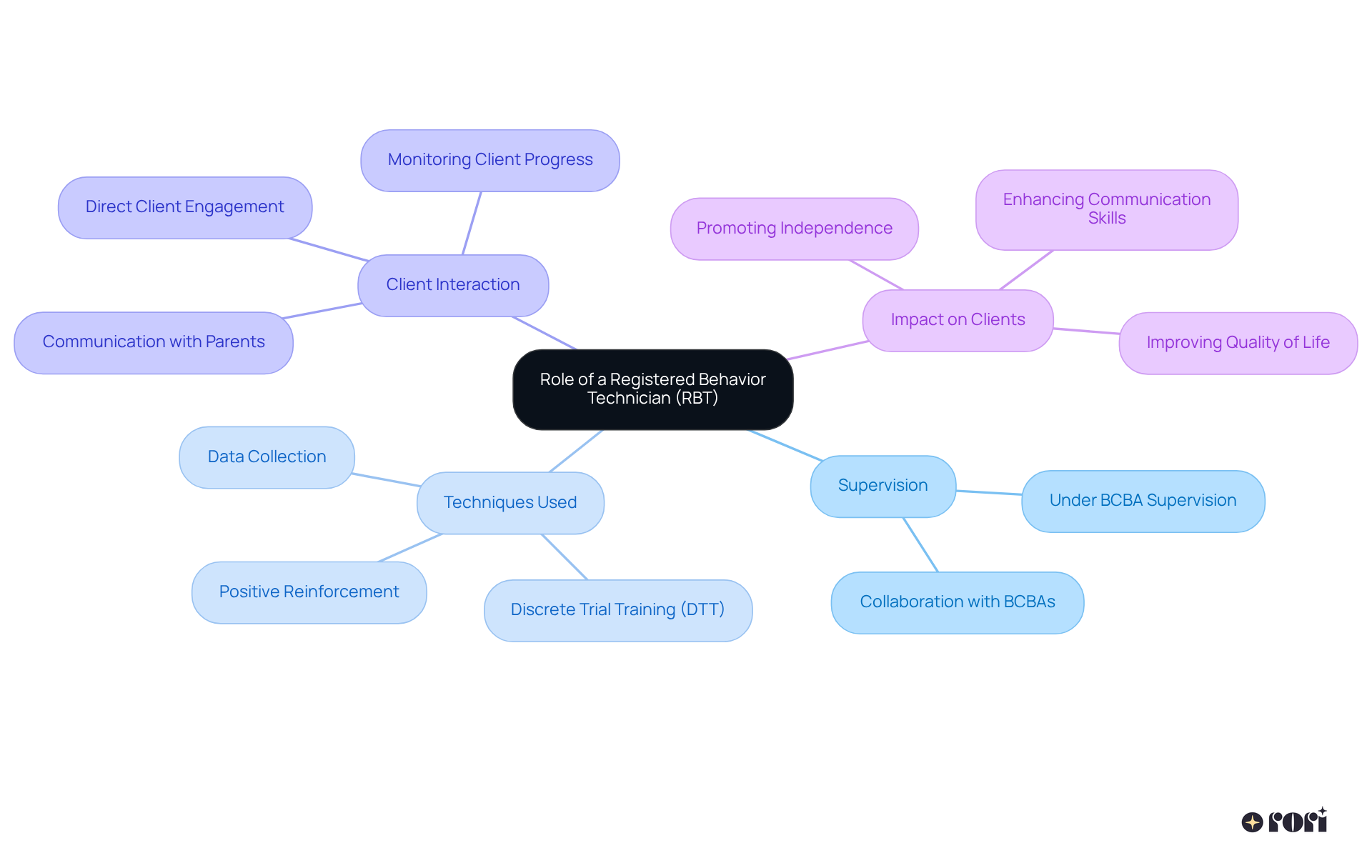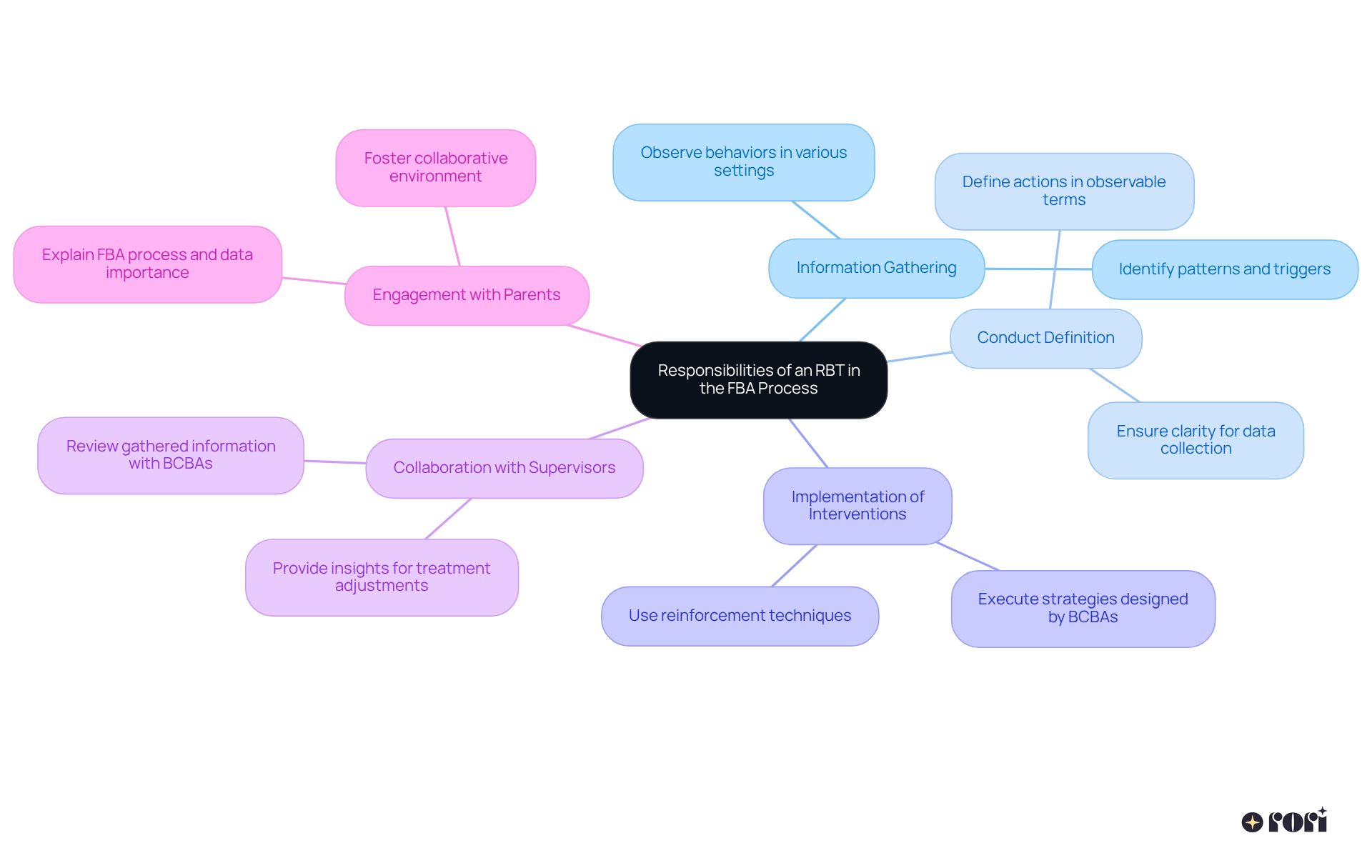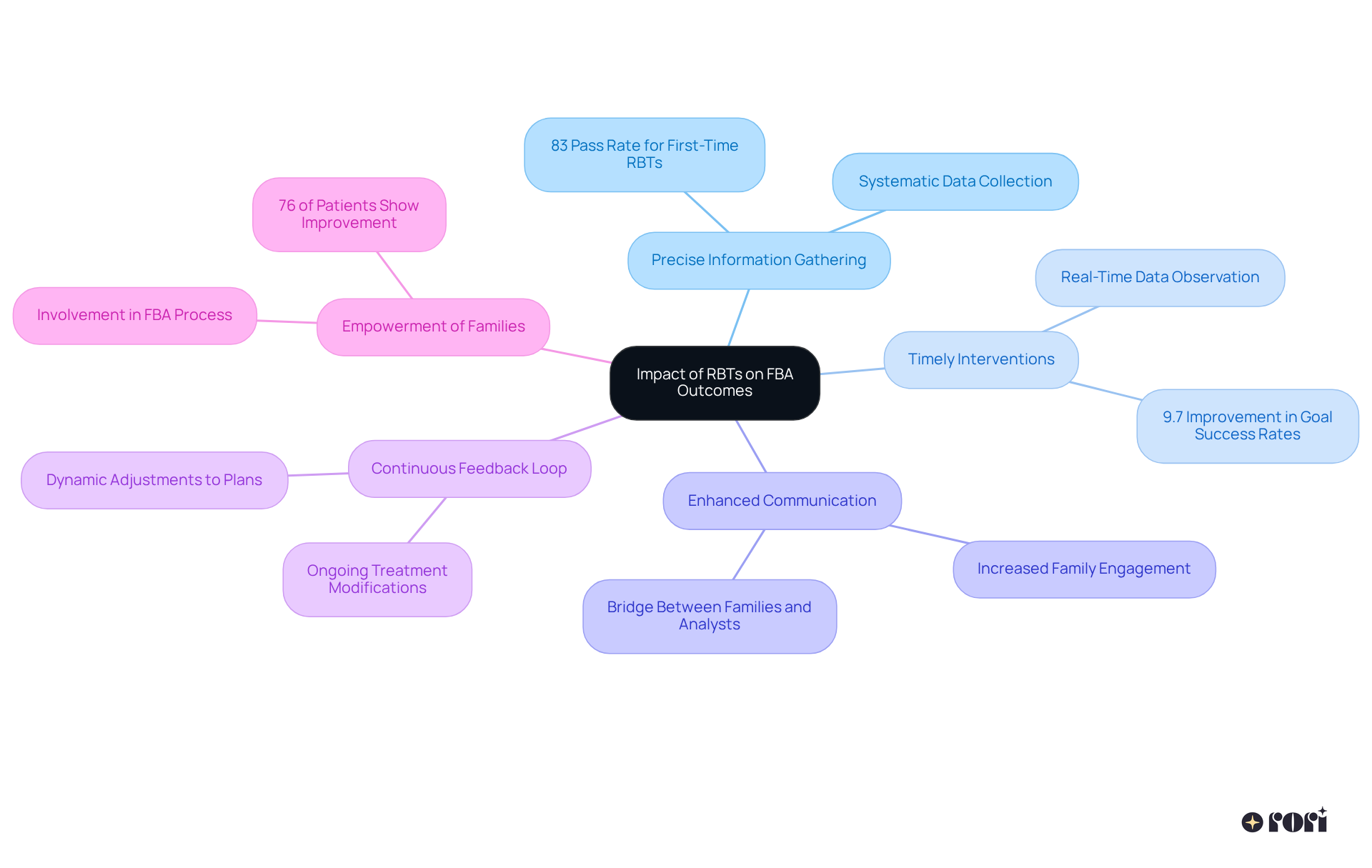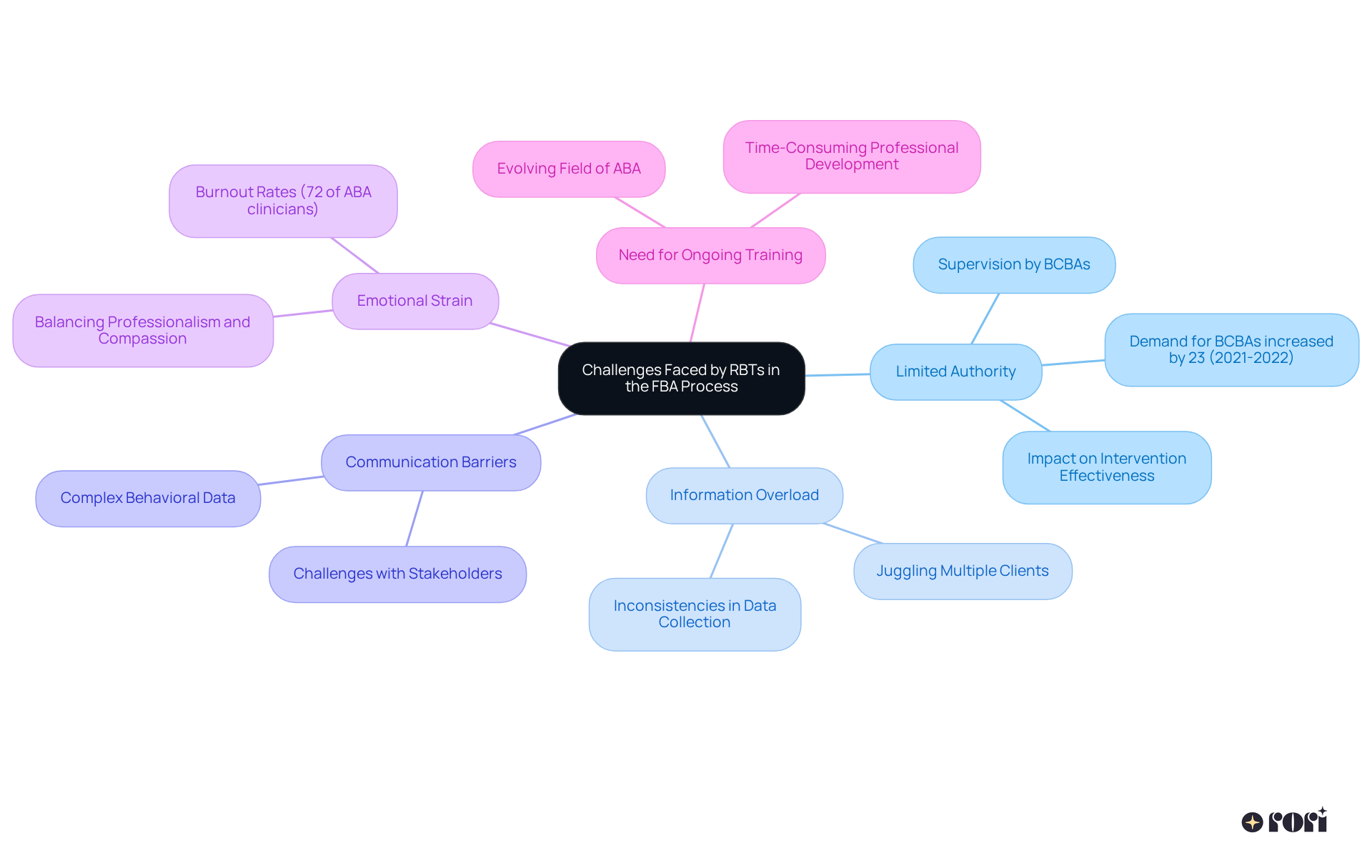The role of a Registered Behavior Technician (RBT) in the Functional Behavior Assessment (FBA) process is truly valuable! RBTs:
It's amazing how RBTs enhance the FBA process through precise data collection and clear communication. This approach helps tailor interventions to meet individual needs and creates a collaborative environment for effective treatment. Let’s explore this together and see how RBTs can make a difference in your journey!
Understanding the intricate dynamics of behavioral assessments is essential in the world of Applied Behavior Analysis (ABA), especially for Registered Behavior Technicians (RBTs). These professionals are more than just assistants; they play a crucial role in the Functional Behavior Assessment (FBA) process. They significantly contribute to collecting and analyzing data that shapes effective interventions.
But what does this role really involve? And how can RBTs tackle the challenges they face to maximize their impact?
Let’s explore these questions together, as we uncover the vital contributions of RBTs in fostering positive outcomes for individuals with developmental disorders.
A Registered Behavior Technician (RBT) plays a vital role in the world of Applied Behavior Analysis (ABA). Working closely under the supervision of a Board Certified Behavior Analyst (BCBA) or a Board Certified Assistant Behavior Analyst (BCaBA), RBTs are essential in implementing behavior-analytic services. This involves direct interactions with clients, careful data collection, and support in executing personalized treatment plans.
Their involvement is especially important for children with autism and other developmental disorders. RBTs apply evidence-based techniques to promote positive behavior changes and help kids acquire new skills. This hands-on approach not only enhances the effectiveness of ABA therapy but also significantly impacts treatment outcomes. In fact, RBTs play what is an appropriate role for an RBT in the FBA process.
By using strategies like Positive Reinforcement and Discrete Trial Training (DTT), RBTs create engaging learning environments that encourage client progress and independence. Their commitment to maintaining open communication with parents and caregivers ensures that treatment plans are tailored to meet each child's unique needs. Ultimately, this dedication enhances the quality of life for those with autism.
Let’s explore this together! RBTs are here to support you every step of the way!

In the FBA process, it is essential to understand what is an appropriate role for an RBT, as they have several important roles that significantly contribute to effective behavioral assessments. Let’s take a closer look at what they do!
Information Gathering. RBTs carefully observe children in various settings, noting specific actions and occurrences of targeted behaviors. This information is crucial for spotting patterns and triggers behind challenging behaviors, helping us understand the child’s needs better.
Conduct Definition. RBTs are essential in defining the actions being evaluated, ensuring they are described in observable and measurable terms. This clarity is key for accurate information collection and analysis, allowing us to track behavioral changes consistently.
Implementation of Interventions. While RBTs don’t design the interventions themselves, they play a vital role in putting into practice the strategies created by Board Certified Behavior Analysts (BCBAs) based on the FBA findings. This includes using reinforcement techniques and teaching replacement behaviors to encourage positive outcomes.
RBTs also focus on what is an appropriate role for an RBT in the FBA process, emphasizing collaboration with supervisors. They work hand-in-hand with BCBAs to review the information gathered and discuss findings. Their firsthand insights from working directly with clients are invaluable for making necessary adjustments to treatment plans, ensuring that the interventions stay effective and responsive to each individual’s evolving needs.
Finally, let’s discuss what is an appropriate role for an RBT in the FBA process. RBTs engage with parents about the FBA process, helping them understand the data collected and its importance for their child’s treatment plan. This open communication fosters a collaborative environment, empowering parents to be active participants in their child’s care.
Together, we can navigate this journey, ensuring our children receive the best support possible! If you have any questions or thoughts, feel free to share them—let’s explore this together!

In considering the quality and effectiveness of behavioral evaluations, it is important to ask what is an appropriate role for an RBT in the FBA process, as their participation truly enhances these assessments. Their direct interaction with clients allows for some amazing benefits!
First up is Precise Information Gathering. Registered Behavior Technicians are trained to systematically gather information, leading to trustworthy and valid evaluations of behavior. This precision is crucial for crafting effective intervention strategies. Did you know that in 2021, first-time RBT test takers had an impressive 83% pass rate? That’s a solid foundation in collection practices!
Next, we have Timely Interventions. By closely observing behaviors and gathering data in real-time, these technicians can quickly recognize immediate needs. This means they can enable prompt interventions that tackle challenging behaviors before they escalate. This proactive approach has been shown to improve goal success rates by 9.7% after implementing hybrid ABA treatment models—what a positive trend!
Let’s not forget about Enhanced Communication. The role of Registered Behavior Technicians in the FBA process raises an important question: what is an appropriate role for an RBT in the FBA process, as they act as a bridge between families and behavior analysts, ensuring that parents are informed and engaged? This collaboration creates a nurturing atmosphere for the individual, boosting the chances of positive outcomes.
Another great aspect is the Continuous Feedback Loop. The insights gathered by behavior technicians guide ongoing treatment modifications. This feedback loop allows for dynamic adjustments to intervention plans, ensuring they remain effective and relevant to the individual's needs. Research shows that regular feedback mechanisms significantly enhance the overall success of behavioral interventions—how reassuring is that?
Finally, there’s the Empowerment of Families. By involving parents in the FBA process and explaining the data collected, behavior technicians help families understand what is an appropriate role for an RBT in the FBA process in their child's therapy. This engagement can lead to better adherence to treatment plans and improved outcomes, as families become integral partners in the therapeutic journey. In fact, 76% of patients had various objectives improving after introducing hybrid ABA treatment models, highlighting the positive impact of registered behavior technicians on family involvement and treatment compliance.
Let’s explore this together! We’re here to help you every step of the way!

When considering the challenges faced, one may ask, what is an appropriate role for an RBT in the FBA process? Let’s take a closer look at these hurdles together!
Limited Authority: RBTs work under the supervision of Board Certified Behavior Analysts (BCBAs), which means they can’t always make independent decisions about interventions. This can slow things down when quick changes are needed, affecting how effective the intervention is. Did you know that the demand for BCBAs jumped by 23% from 2021 to 2022? It really highlights how crucial effective supervision is for RBTs.
Information Overload: Gathering a ton of information can feel overwhelming, especially when RBTs are juggling multiple clients. If they’re not careful, this can lead to inconsistencies in how information is collected and analyzed, which might affect the quality of evaluations. It’s a lot to manage!
Communication Barriers: Communicating complex behavioral data to parents and other stakeholders is super important, but it can be tricky. RBTs often find it challenging when their audience isn’t familiar with behavior analysis. This can make understanding and cooperation difficult. Experts say these communication barriers can really impact what is an appropriate role for an RBT in the FBA process, highlighting the importance for RBTs to develop effective strategies to share information clearly.
Emotional Strain: Working with children who exhibit challenging behaviors can take an emotional toll. RBTs need to balance being professional with showing compassion, which can lead to burnout if they don’t manage it well. In fact, around 72% of ABA clinicians report medium to high levels of burnout. This emphasizes the need for supportive measures in the workplace to help RBTs take care of their emotional well-being.
Need for Ongoing Training: The field of Applied Behavior Analysis (ABA) is always evolving, which means RBTs need to keep up with ongoing professional development. While this is important, it can also be time-consuming and tough to fit into their busy schedules. Providing comprehensive training and continuous development opportunities is key to preventing burnout and boosting job satisfaction for RBTs.
These challenges really show how important it is to have supportive supervision and effective communication strategies in place. By addressing these issues, we can clarify what is an appropriate role for an RBT in the FBA process and ultimately lead to better outcomes for the children they serve. Let’s explore this together!

The role of a Registered Behavior Technician (RBT) in the Functional Behavior Assessment (FBA) process is not just important; it’s truly multifaceted! RBTs are the backbone of Applied Behavior Analysis (ABA), working alongside certified behavior analysts to implement effective strategies that help promote positive behavior changes in children with developmental disorders. Their hands-on involvement not only enhances the quality of behavioral assessments but also plays a significant part in the success of treatment plans.
In this article, we’ve explored the key responsibilities of RBTs. They:
By systematically collecting data and providing timely feedback, RBTs ensure that interventions are tailored to each child's unique needs, ultimately leading to improved outcomes. Of course, RBTs face challenges too, such as limited authority and communication barriers. This highlights the need for supportive supervision and ongoing training to enhance their effectiveness in the FBA process.
Recognizing the vital contributions of RBTs in the FBA process really underscores their importance in the broader context of behavioral therapy. As they navigate challenges and advocate for their clients, RBTs empower families and foster collaboration, which is essential for achieving positive behavioral outcomes. Let’s emphasize the need for effective communication and support—it can truly lead to enhanced success in behavioral interventions! It’s so important for stakeholders to invest in the growth and development of RBTs.
So, as we wrap up, let’s explore this together! The journey of RBTs is a testament to the power of collaboration and support in behavioral therapy. We’re here to help you every step of the way!
What is the role of a Registered Behavior Technician (RBT)?
A Registered Behavior Technician (RBT) plays a vital role in Applied Behavior Analysis (ABA) by implementing behavior-analytic services under the supervision of a Board Certified Behavior Analyst (BCBA) or a Board Certified Assistant Behavior Analyst (BCaBA).
Who do RBTs typically work with?
RBTs primarily work with children who have autism and other developmental disorders.
What are some key responsibilities of an RBT?
Key responsibilities of an RBT include direct interactions with clients, careful data collection, and supporting the execution of personalized treatment plans.
How do RBTs contribute to the effectiveness of ABA therapy?
RBTs apply evidence-based techniques to promote positive behavior changes and help children acquire new skills, significantly impacting treatment outcomes.
What strategies do RBTs use in their practice?
RBTs use strategies like Positive Reinforcement and Discrete Trial Training (DTT) to create engaging learning environments that encourage client progress and independence.
How do RBTs communicate with parents and caregivers?
RBTs maintain open communication with parents and caregivers to ensure that treatment plans are tailored to meet each child's unique needs.
What is the ultimate goal of an RBT's work?
The ultimate goal of an RBT's work is to enhance the quality of life for individuals with autism and support their development and independence.